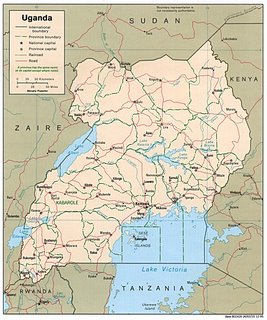Kampala
The city drapes itself over hills and small valleys, covering them in patches of rust-coloured metal roofs, dusty soccer fields, and green lawns. Its roads circulate in loops and branches, fading outwards into towns where young children plod alongside, carrying the day’s water on their heads in yellow plastic gas jugs. Universal primary education means that those able to afford uniforms, pens, paper, and books, will spend the next few hours at school. The other forty percent will help their parents in houses and fields, collecting firewood, and playing at the side of roads that slowly spiral back into the city.
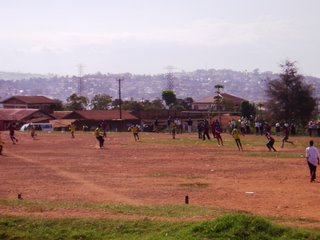
Soccer Field
Children with branches rolling used bicycle tires along the dirt road gradually give way to Matatus, fourteen passenger minivans that race with reckless disregard for obstacles and each other into the city’s heart, a sea of white metal, where all routes converge. Here ordered chaos reigns. The unwary find themselves startled and sandwiched between white behemoths while vendors hawk their wares, oblivious to the chaos, as they gracefully weave through the whirling traffic.
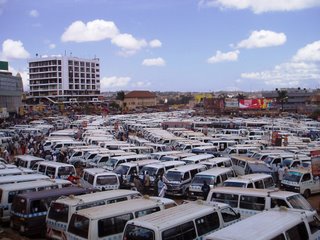
Central Taxi Park
Along the sides of the park, stretching throughout the downtown core, street vendors recline next to mats covered in cuff links, prayer books, wallets, and bibles. Next to them are newspapers, weighted down with shards of broken glass to keep them from escaping in the breeze. The New Vision proudly proclaims the government’s accomplishments. The Daily Monitor decries its excesses. The Red Pepper falls back on Freud, selling the latest crimes, collisions, and scandals with only the most graphic photos that can be found to illustrate them. The truth lies somewhere in between. No one seems certain what it is but it makes for lively discussion.
Never empty, conductors attract new passengers to the minivan taxis, proclaiming their destinations in a chant: Kamwokya Ntinda Bokoto, Kamwokya Ntinda Bokoto, Kamwokya Ntinda Bokoto. As the tarmac arteries leave the city’s heart, its few towering buildings give way to smaller blocks of flats. Motorcycles and Matatus circulate through the routes, carrying passengers at breakneck speeds in chaotic flows where signaling is optional. Sometimes necks are broken. More often it is legs, arms, and hips.
For these unlucky many, the destination is Mulago, the country’s largest hospital. Here wounds are tended and illnesses treated with whatever supplies are available. Between its large central building and outlying clinics, the hospital covers a hillside. Spread out on the grass between the cilincs, visitors wash laundry in plastic buckets, leaving clothes to dry on the lawn.

The Grounds at Mulago
Storks, ungainly, awkward, and even ugly on the ground, swoop gracefully through the sky overhead. To them the hospital must seem a small sea of bed sheets dotted by red-roofed clinics. Some of these birds will stop to land less than a kilometer away near our house, attracted by the prospect of a quick snack at the garbage pile generated by our buildings.
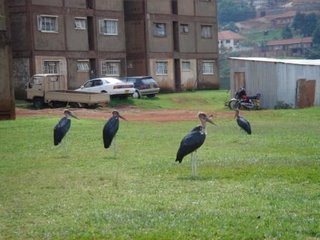
Storks near our Flat
At the end of the day we follow the same route on the ground, returning to an apartment in this anonymous block of brown flats. Peopled by Ugandans, South Asians, and even the occasional white foreigner, it’s an open, friendly, and welcoming community.
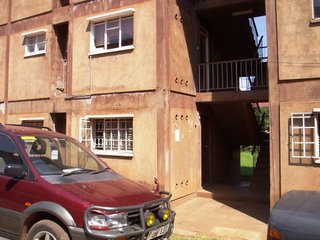
Our Flat
This evening we’ll walk up the hill, along the wooden shops that line the road outside. At the top is the hotel from which we access the Internet. On the way back down the sun will have set. With no power tonight, the road will be left in darkness, creating an effect I have seen in no other city on Earth. Buildings powered on distant hillsides will shine in small patches of light as they salute a vast field of stars above.
